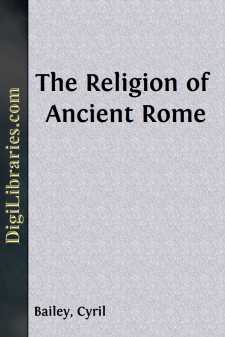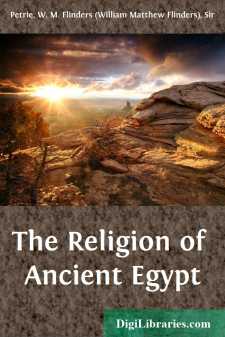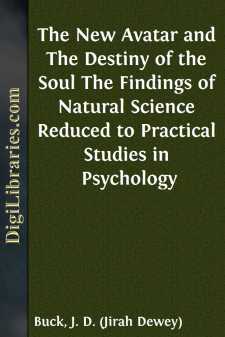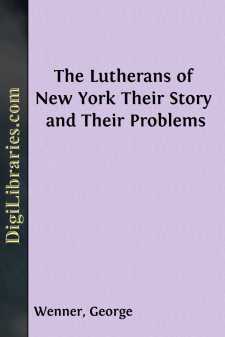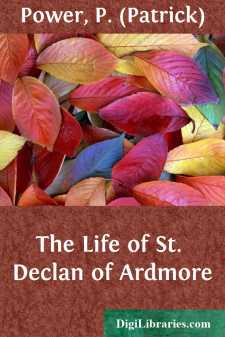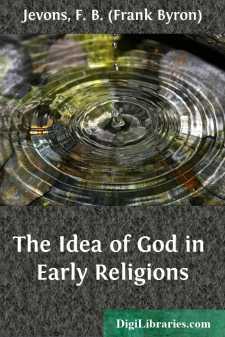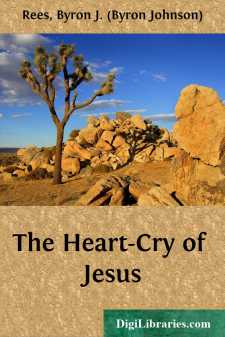Religion
- Agnosticism 2
- Antiquities & Archaeology 21
- Atheism 12
- Biblical Criticism & Interpretation 15
- Biblical Meditations 3
- Biblical Reference 1
- Biblical Studies 11
- Buddhism 8
- Christian Church 52
- Christian Education 5
- Christian Life 26
- Christianity 60
- Cults 2
- Devotional 6
- Eastern 2
- Education 4
- Eschatology 1
- Ethics 3
- General
- Gnosticism 1
- Hinduism 15
- History 28
- Holidays 10
- Inspirational 1
- Islam 8
- Judaism 3
- Leadership 1
- Meditations 3
- Monasticism 1
- Mysticism 11
- Philosophy 4
- Prayer 26
- Prayerbooks 5
- Religion & Science 12
- Sermons 54
- Spirituality 53
- Theism 2
- Theology 17
- Theosophy 15
General Books
Sort by:
by:
Cyril Bailey
CHAPTER I INTRODUCTION—SOURCES AND SCOPE The conditions of our knowledge of the native religion of early Rome may perhaps be best illustrated by a parallel from Roman archæology. The visitor to the Roman Forum at the present day, if he wishes to reconstruct in imagination the Forum of the early Republic, must not merely 'think away' many strata of later buildings, but, we are told, must...
more...
CHAPTER I THE NATURE OF GODS Before dealing with the special varieties of the Egyptians' belief in gods, it is best to try to avoid a misunderstanding of their whole conception of the supernatural. The term god has come to tacitly imply to our minds such a highly specialised group of attributes, that we can hardly throw our ideas back into the more remote conceptions to which we also attach the...
more...
INTRODUCTION. THE SIGNIFICANCE OF FRANZ CUMONT'S WORK. Franz Cumont, born January 3, 1868, and educated at Ghent, Bonn, Berlin, and Paris, resides in Brussels, and has been Professor in the University of Ghent since 1892. His monumental work, Textes et monuments figurés relatifs aux mystères de Mithra, published in 1896 and 1899 in two volumes, was followed in 1902 by the separate publication,...
more...
FOREWORD The reader who is willing to give the following pages a careful reading, and a courteous hearing, is entitled to know the basis of study, observation or experience from which the suggestions, inferences and conclusions proceed, in order that he may fairly estimate their value. At the age of seventy-two, my egotism is at least softened by the discovery of the many things I do not know; and my...
more...
by:
Anonymous
THE MORAVIANS IN LABRADOR CHAPTER I. Hudson's Bay Company first settle among the Esquimaux.—J.C. Erhardt suggests a mission—his letter to the Moravian Bishop.—M. Stach consulted.—London merchants undertake the scheme—engage Erhardt—its fatal conclusion.—Jans Haven employed by the Brethren, encouraged by the British Government, sets out on a voyage of discovery—his providential...
more...
by:
George Wenner
Introduction For the sake of non-Lutheran readers it may be well, in a sketch of the story and problems of our churches, to present a short statement of their principles and to indicate in what respect these differ from the general attitude and beliefs of other churches. In doing so however the author does not presume to encroach upon the field belonging to the scholars of the church. He is not an...
more...
INTRODUCTION "If thou hast the right, O Erin,to a champion of battle to aid theethou hast the head of a hundredthousand, Declan of Ardmore"(Martyrology of Oengus). Five miles or less to the east of Youghal Harbour, on the southern Irish coast, a short, rocky and rather elevated promontory juts, with a south-easterly trend, into the ocean [about 51 deg. 57 min. N / 7 deg. 43 min. W]. Maps and...
more...
Every child that is born is born of a community and into a community, which existed before his birth and will continue to exist after his death. He learns to speak the language which the community spoke before he was born, and which the community will continue to speak after he has gone. In learning the language he acquires not only words but ideas; and the words and ideas he acquires, the thoughts he...
more...
CHAPTER I. CHRIST'S WORDS. All who really love Christ love His words. They may not always fully understand their meaning, but they never reject any of them. The very fact that any word has been on the lips of Christ and received His sanction, gives it a sound of music to all who are truly disciples of the Nazarene. MOTHER'S WORDS. The words that your mother used frequently—are there any...
more...
CHAPTER I. SEX THE FOUNDATION OF THE GOD-IDEA. In the study of primitive religion, the analogy existing between the growth of the god-idea and the development of the human race, and especially of the two sex-principles, is everywhere clearly apparent. "Religion is to be found alone with its justification and explanation in the relations of the sexes. There and therein only."(3) 3) Hargrave...
more...


